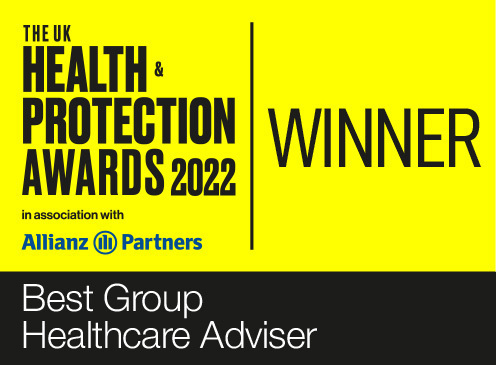Group Health Cash Plan
Our team of independent experts are here to help you:
- Understand how Business Health Cash Plans work
- Discover the best value scheme for your company
- Support the routine health needs of your team
Group Health Cash Plan











It’s a form of health insurance which provides cover for the more typical, everyday healthcare costs which we all experience. Like many healthcare insurance schemes, there are policies available for both businesses and individuals.
While the benefit levels are lower than traditional Group Medical Insurance, they can be used more frequently, increasing the perceived value to the employee.
The Cash Plan market has become very competitive in recent years and in response to that, the range of benefits on offer has improved greatly.
You might also see it referred to as Group/Company Health Cash Plan.
There are a number of key benefits to investing in a Health Cash Plan for employees:
Health Cash Plans are priced at a per member per week/month cost, and the amount is based on the cover level chosen. Small business plans are offered at a set cost by insurers with larger business solutions requiring a more bespoke pricing method.
A small business Health Cash Plan can be purchased for as little as £4.33 per employee, per month. The average monthly cost for under 10 employees is £5.65 and for 10+ employees a plan will be in the region of £4.75 per person, per month.*
*Costs have been calculated based on numerous insurer business health cash plans in their under and over 10 employee categories. Prices are indicative only and are subject to change.
“Engage Health Group have always delivered a fast and professional service when I have requested support when designing Employee Benefits Packages.”
- HR Consultancy, Chichester
Most major health insurance providers offer a Cash Plan scheme. Like any other form of insurance, costs will vary and so will the features of each policy. This makes direct price comparison difficult.
For example, a low-cost Business Health Cash Plan with limited coverage may not provide the level of health support which provides genuine value to staff and business alike.
Before investing in any type of health insurance scheme, it’s vital to take into account the following factors:
There are two ways of investing in a Cash Plan (or any other employee benefits scheme):
In the first instance, you’ll be speaking directly to the sales advisor (though they may be called something different) at the insurance company. They are highly trained in providing an attractive sales spiel which makes their product stand out against the competition. However, ultimately their priority is to emphasise the quality of their product and close the deal – rather than provide an objective comparison to other providers.
An insurance broker works on your behalf to find the best deal from a variety of insurance providers. However, some insurance brokers have preferred relationships with one or two insurance providers which means they are not truly independent.
At Engage, we work across the whole market to uncover the best deals.
There are some key benefits to working with an independent health insurance broker:
To be certain you’re buying the right Business Health Cash Plan scheme for your company, at the best available price, it’s strongly advised to employee the services of an expert insurance broker.
Call our team on +44 (0)1273 974419 for a FREE consultation.
Health Cash Plans for employees are not offered by every health insurance provider, but the following companies do offer the scheme:
Yes! One of the great benefits of a Company Health Cash Plan is that employees can make claims immediately, even if the condition being claimed for is already known to them. There is no medical to join and as the individual benefits are usually capped at a specific value, the insurer has some protection here.
Most Health Cash Plan providers offer between 4-6 cover levels for smaller businesses, with the claimable amounts increasing as the cover level does. These cover levels are set and there is little flexibility available, however, they are usually completely sufficient for the needs of smaller organisations.
For larger businesses (typically over 20 employees or £3,000 in annual premium), plans can be more bespoke and employers can tailor the benefits as they choose. For example, one business might decide that they want six prescriptions covered per annum, instead of the standard two.
Group Cash Plans for small businesses (under 20 employees) will typically be “community rated”. This means that they are pooled with hundreds of similar sized businesses and receive a controlled and gradual increase each year, irrespective of how much each individual group has claimed. This approach offers premium certainty and protection to smaller businesses and gives reassurance that the cost won’t suddenly inflate above their budget.
For larger businesses, it is more likely that the pricing will be “claims rated”. This means that at certain renewals, the insurer will assess how the individual group has performed (premium paid vs claims made) and can adjust the premium accordingly to ensure that it accurately reflects the risk posed. Of course this offers less certainty to the employer but they can often secure two-year fixed deals to counter this somewhat.
Cash Plans are one of the easiest insurances for making claims, and little is needed by way of claims assessment.
The claims process involves employees paying for their treatment themselves, and then claiming the cost back from the insurer. The most important thing for employees is that they retain the receipt of their treatment as this must be submitted as part of the claim.
The method of claiming is different between insurers but the common routes are:
Insurer App
Taking a picture of the receipt using a smart phone and then submitting the claim electronically.
Insurer Website
Registering on the insurer website and submitting a claim via their online portal.
Paper forms
Completing a paper claim form and emailing/posting this to the insurer.
For those insurers who operate apps and online portals, employees are able to house their bank account details securely, meaning that payment can be made quickly, usually within 1-2 days.
Most corporate Health Cash Plans will include cover for dependant children for free; however, children would usually have to share their parents’ benefit pot.
For example, sometimes an insurer will say that children can claim up to 50% of the employee benefit amount in each category.
Partners can also be included on cover at an additional cost to the employee, either via a separate direct debit or a deduction via payroll. As partners are charged for in full, they have equal benefit levels to that of the employee.
Yes – it is quite common for an employer to fund a company Health Cash Plan at say, Level 2, and then give employees the opportunity to voluntarily upgrade to Level 3 or 4. Again, this can be paid via a separate direct debit from the employee, or as a deduction via payroll.
Some employers might also choose to provide different cover levels based on seniority, grade or length of service. The enhanced cover level could also include funding partners.
Many insurers do provide worldwide cover so that employees can access the benefits no matter where they happen to be. However, this would be for when employees are travelling, rather than for employees permanently based abroad. Also, some benefits might not be available, such as face-to-face counselling.
There are Health Cash Plan providers who have international solutions for employers with staff based in different global locations. For a plan like this, expert advice should be taken to ensure the policy is compliant.
As insurers look to provide more value than ever, there is an increasing number of support services which employees can access for free. These can include:

Engage Health Group Ltd is registered in England and Wales. Companies House (No. 10075534). Engage Health Group Ltd registered office: 1a City Gate, 185 Dyke Road, Hove, England, BN3 1TL. Engage Health Group Ltd is authorised and regulated by the Financial Conduct Authority (No 812846). Important – insurance policy benefits will cease if you stop paying the premiums on your policy.
| Cookie | Duration | Description |
|---|---|---|
| cookielawinfo-checkbox-analytics | 11 months | This cookie is set by GDPR Cookie Consent plugin. The cookie is used to store the user consent for the cookies in the category "Analytics". |
| cookielawinfo-checkbox-functional | 11 months | The cookie is set by GDPR cookie consent to record the user consent for the cookies in the category "Functional". |
| cookielawinfo-checkbox-necessary | 11 months | This cookie is set by GDPR Cookie Consent plugin. The cookies is used to store the user consent for the cookies in the category "Necessary". |
| cookielawinfo-checkbox-others | 11 months | This cookie is set by GDPR Cookie Consent plugin. The cookie is used to store the user consent for the cookies in the category "Other. |
| cookielawinfo-checkbox-performance | 11 months | This cookie is set by GDPR Cookie Consent plugin. The cookie is used to store the user consent for the cookies in the category "Performance". |
| viewed_cookie_policy | 11 months | The cookie is set by the GDPR Cookie Consent plugin and is used to store whether or not user has consented to the use of cookies. It does not store any personal data. |